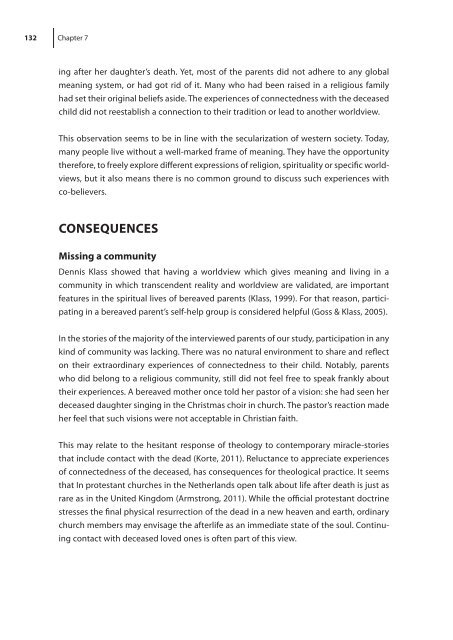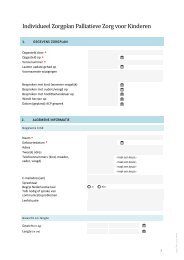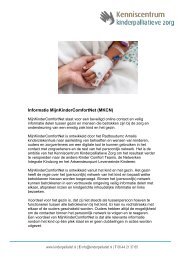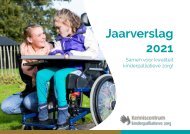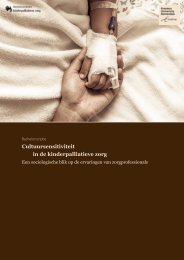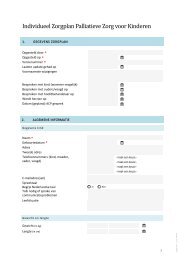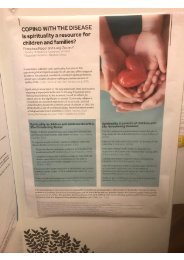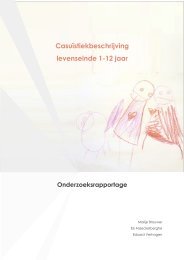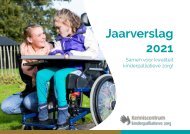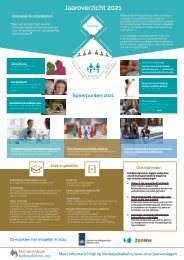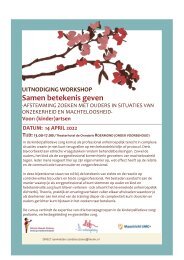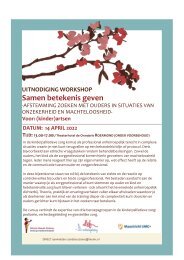Unveiling a fragile spirituality: Experiences of connectedness in pediatric palliative care
Create successful ePaper yourself
Turn your PDF publications into a flip-book with our unique Google optimized e-Paper software.
132 Chapter 7<br />
<strong>in</strong>g after her daughter’s death. Yet, most <strong>of</strong> the parents did not adhere to any global<br />
mean<strong>in</strong>g system, or had got rid <strong>of</strong> it. Many who had been raised <strong>in</strong> a religious family<br />
had set their orig<strong>in</strong>al beliefs aside. The experiences <strong>of</strong> <strong>connectedness</strong> with the deceased<br />
child did not reestablish a connection to their tradition or lead to another worldview.<br />
This observation seems to be <strong>in</strong> l<strong>in</strong>e with the secularization <strong>of</strong> western society. Today,<br />
many people live without a well-marked frame <strong>of</strong> mean<strong>in</strong>g. They have the opportunity<br />
therefore, to freely explore different expressions <strong>of</strong> religion, <strong>spirituality</strong> or specific worldviews,<br />
but it also means there is no common ground to discuss such experiences with<br />
co-believers.<br />
CONSEQUENCES<br />
Miss<strong>in</strong>g a community<br />
Dennis Klass showed that hav<strong>in</strong>g a worldview which gives mean<strong>in</strong>g and liv<strong>in</strong>g <strong>in</strong> a<br />
community <strong>in</strong> which transcendent reality and worldview are validated, are important<br />
features <strong>in</strong> the spiritual lives <strong>of</strong> bereaved parents (Klass, 1999). For that reason, participat<strong>in</strong>g<br />
<strong>in</strong> a bereaved parent’s self-help group is considered helpful (Goss & Klass, 2005).<br />
In the stories <strong>of</strong> the majority <strong>of</strong> the <strong>in</strong>terviewed parents <strong>of</strong> our study, participation <strong>in</strong> any<br />
k<strong>in</strong>d <strong>of</strong> community was lack<strong>in</strong>g. There was no natural environment to share and reflect<br />
on their extraord<strong>in</strong>ary experiences <strong>of</strong> <strong>connectedness</strong> to their child. Notably, parents<br />
who did belong to a religious community, still did not feel free to speak frankly about<br />
their experiences. A bereaved mother once told her pastor <strong>of</strong> a vision: she had seen her<br />
deceased daughter s<strong>in</strong>g<strong>in</strong>g <strong>in</strong> the Christmas choir <strong>in</strong> church. The pastor’s reaction made<br />
her feel that such visions were not acceptable <strong>in</strong> Christian faith.<br />
This may relate to the hesitant response <strong>of</strong> theology to contemporary miracle-stories<br />
that <strong>in</strong>clude contact with the dead (Korte, 2011). Reluctance to appreciate experiences<br />
<strong>of</strong> <strong>connectedness</strong> <strong>of</strong> the deceased, has consequences for theological practice. It seems<br />
that In protestant churches <strong>in</strong> the Netherlands open talk about life after death is just as<br />
rare as <strong>in</strong> the United K<strong>in</strong>gdom (Armstrong, 2011). While the <strong>of</strong>ficial protestant doctr<strong>in</strong>e<br />
stresses the f<strong>in</strong>al physical resurrection <strong>of</strong> the dead <strong>in</strong> a new heaven and earth, ord<strong>in</strong>ary<br />
church members may envisage the afterlife as an immediate state <strong>of</strong> the soul. Cont<strong>in</strong>u<strong>in</strong>g<br />
contact with deceased loved ones is <strong>of</strong>ten part <strong>of</strong> this view.


